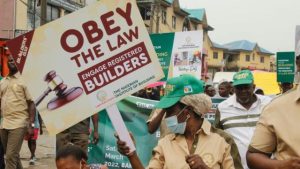Why Lagos Faces a Building Collapse Crisis
3 min read
Collapse after collapse - why Lagos buildings keep crashing down

Collapse after collapse - why Lagos buildings keep crashing down
In Nigeria’s bustling megacity of Lagos, building collapses have become a distressing norm, with an average of one incident occurring every two weeks this year alone. While the financial implications are quantifiable, the loss of life beneath the rubble is incalculable. These frequent collapses underscore systemic failures in governance and raise suspicions about contractors cutting corners to save costs.
Despite existing regulations, maintenance schedules, and inspection protocols, the system fails to function effectively. Accountability is notably lacking, perpetuating a cycle of negligence. Dubbed by an expert as “the building-collapse capital of Nigeria,” Lagos has witnessed at least 90 building collapses over the past 12 years, resulting in more than 350 fatalities, according to the Council for the Regulation of Engineering in Nigeria.
One of the most notorious cases occurred in 2021 when a 21-story luxury apartment building under construction collapsed in the upscale Ikoyi neighborhood, killing 42 people. Sunday Femi, a local resident, recounted the harrowing scene: “I was just meters away when it happened. The sound was deafening, and I was engulfed in dust. I tried to help but knew some of the victims personally. It’s a tragedy that haunts me every day.”

Femi, who still works near the site, notes that locals frequently discuss the collapse and speculate about its causes. The site remains shrouded from public view by metal sheeting, and broken concrete is visible through gaps in the gate. When approached, security guards denied entry to anyone except state government officials. The investigation report into the Ikoyi collapse has been with the state governor since 2022, but it remains undisclosed. Despite numerous requests from the BBC, Lagos state authorities have not made the recommendations or the full report available.
In 2022, Chief Magistrate Oyetade Komolafe criticized the government’s role in the collapse, attributing the disaster to their irresponsibility and negligence. Lagos’s population, now exceeding 20 million, has led to a surge in demand for housing and commercial properties, transforming the city into a sprawling construction zone. Construction projects must first receive approval from the Lagos State Physical Planning Permit Agency. Subsequently, the Lagos State Building Control Agency (LASBCA) is supposed to oversee the construction process, and the Standards Organisation of Nigeria ensures that building materials meet safety standards.
However, adherence to these procedures is inconsistent. Inside LASBCA’s offices, there is a noticeable lack of urgency regarding the ongoing issues. Spokesperson Olusegun Olaoye acknowledges the criticism but attributes the problems to a shortage of resources rather than corruption. “We currently have about 300 building inspectors and supervisors and are working to increase that number,” he explains. Experts argue that this number is woefully inadequate for a state like Lagos. Architect and construction expert Muhammad Danmarya asserts that Lagos needs thousands of inspectors, with each local government area requiring at least 100.

Without adequate inspection and supervision, some contractors flout building codes, use substandard materials, and hire poorly trained workers. Laborer Habu Isah, who has worked on construction sites for years, reveals, “I’ve never received formal training; I’ve learned everything on the job.” Even when violations are discovered after a collapse, the LASBCA rarely pursues legal action. “To my knowledge, there haven’t been any prosecutions for building collapses in Lagos,” admits Olaoye.
Political influence often obstructs justice. A Lagos politician, speaking anonymously, claims that connections to powerful figures can shield individuals from accountability. “We’ve seen high-profile cases where the culprits remain free due to their connections,” the politician asserts. “In Nigeria, wealth and influence often prevent real consequences.”
This year, Lagos State Emergency Management Agency has recorded 19 building collapses so far, indicating that the total number for the year may be the highest in a decade. Yet, it seems that the necessary lessons will remain unlearned. Prof. Sadiq Abubakar, head of the Council for the Regulation of Engineering in Nigeria, recently stated that the country lacks the expertise, equipment, and resources to adequately investigate these incidents. As a result, construction workers and residents will likely continue to bear the brunt of this ongoing crisis.